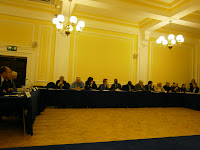
BOOK LAUNCH
 The official launch of New Labour and the European Union was hosted by the Federal Trust in London on 7 April 2011. It was held in Mary Sumner House, off Tufton Street in Westminster, conveniently – given the subject matter – not far from Parliament, Downing Street and Whitehall. Around 50 people were in attendance, including academics, diplomats, business people, journalists, former New Labour advisers and members of think-tanks. MUP’s Tony Mason kindly came along to man the book stall, and the day proceeded very smoothly thanks to the hard work of everyone at the Federal Trust.
The official launch of New Labour and the European Union was hosted by the Federal Trust in London on 7 April 2011. It was held in Mary Sumner House, off Tufton Street in Westminster, conveniently – given the subject matter – not far from Parliament, Downing Street and Whitehall. Around 50 people were in attendance, including academics, diplomats, business people, journalists, former New Labour advisers and members of think-tanks. MUP’s Tony Mason kindly came along to man the book stall, and the day proceeded very smoothly thanks to the hard work of everyone at the Federal Trust.
Following this outline of the book as a whole, the audience was treated to two commentaries on the book from invited commentators. The second speaker was Sir Stephen Wall, former UK Representative to the EU and Blair’s European adviser; the third speaker was Rt Hon Lord Radice, another to have worked closely with the government on European issues. Both gave insider recollections of key policy decisions and challenges from the time and, in the main, supported the crux of the book- that Blair and Brown did not live up to their early promise to construct a ‘pro-European’ consensus about the EU in Britain.
First, was this a loss of nerve or a failure of leadership? A profound irony was noted, that New Labour inserted the word ‘lead’ and ‘leadership’ into almost every foreign policy speech, but on difficult issues such as the Europe question the government seemed incapable of demonstrating any sustained or convincing leadership at all.

Third, what place did referenda have in uprooting New Labour’s early intentions for its European policy, and what kind of referendum might have succeeded in putting the Europe issue to rest? Pledging a referendum but never holding one demonstrated a failure of leadership, and opened the way for a concerted referendum campaign on the part of the sceptical press, which exacerbated the government’s hesitancy to hold one- on the single currency or the Lisbon Treaty.
Finally, many participants remarked on the use British politicians make of ‘Europe’ as a political football. It is an issue that provides many examples of parties positioning themselves for best gain at the polls (Europe as a modernizing strategy for the Labour Party after the debacle of the 1980s, for example). Examples of ‘Europe’ being the principled pursuit of politicians are far fewer. By contrast, Europe has tended to be used by British foreign policy decision-makers as a prop to some rather dated global ambitions. In this regard, Blair, Brown and New Labour echoed tendencies going back as far as Churchill and before.
